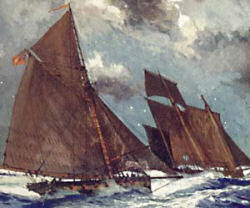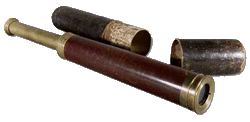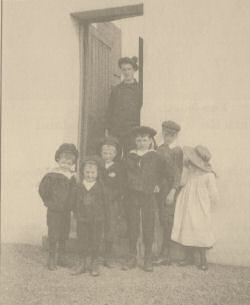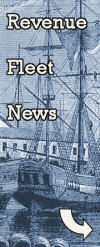| | Hello Friend,
The Coastguards were given prize money if they intercepted a smuggler with contraband on board. This money was paid when the smugglers were successfully prosecuted. Some lucky Cruiser Captains became quite wealthy. Regards,
Tony
Capture of a French Smuggler. 1830.
 On Friday the 2nd.inst, the Water Guard at Annalong, on the county of Down shore, observed a cutter about four leagues distant from land. About 11 o’clock captain Murrow, who commands at that station, thinking that there was something suspicious in her standing (what seamen call) “off and on” ordered some of his party to launch the boat and give chase, which was immediately done and the wind dying away enabled the Guard boat to reach the prize. Several shots were fired from the Coastguard to bring the cutter to, but without effect, the crew being then employed in throwing the cargo overboard; at length about 4 p.m. the Coastguards took possession of the smuggler, and then proceeded to pick up the bales that had been thrown into the sea, which contained tobacco; 56 were collected. The cutter proved to be L’Aurore, from a small port near Brest – burden 30 tons. Her crew consisted of five men and a boy, none of whom could speak a word of English. When the guard boat was within a mile of the cutter, a boat which was in tow with the cutter, left her, and rowed for shore. Capt. Murrow, who observed this movement from the land, had his men ready to lay hold of the boats crew, who proved to be four men belonging to the village of Kilkeel, and a pilot from Dublin, whom the captain said he had taken on board in Dublin Bay. The Captain stated he was bound for the Faro Isles; but we think it more probable, that her cargo was intended for the county of Down. The vessel is now in our canal, and her crew on board under the charge of the Water Guard and police. The vessel and cargo are valued at £1,000. (Newry Telegraph)Ref: Freemans Journal Wednesday 7 July 1830. On Friday the 2nd.inst, the Water Guard at Annalong, on the county of Down shore, observed a cutter about four leagues distant from land. About 11 o’clock captain Murrow, who commands at that station, thinking that there was something suspicious in her standing (what seamen call) “off and on” ordered some of his party to launch the boat and give chase, which was immediately done and the wind dying away enabled the Guard boat to reach the prize. Several shots were fired from the Coastguard to bring the cutter to, but without effect, the crew being then employed in throwing the cargo overboard; at length about 4 p.m. the Coastguards took possession of the smuggler, and then proceeded to pick up the bales that had been thrown into the sea, which contained tobacco; 56 were collected. The cutter proved to be L’Aurore, from a small port near Brest – burden 30 tons. Her crew consisted of five men and a boy, none of whom could speak a word of English. When the guard boat was within a mile of the cutter, a boat which was in tow with the cutter, left her, and rowed for shore. Capt. Murrow, who observed this movement from the land, had his men ready to lay hold of the boats crew, who proved to be four men belonging to the village of Kilkeel, and a pilot from Dublin, whom the captain said he had taken on board in Dublin Bay. The Captain stated he was bound for the Faro Isles; but we think it more probable, that her cargo was intended for the county of Down. The vessel is now in our canal, and her crew on board under the charge of the Water Guard and police. The vessel and cargo are valued at £1,000. (Newry Telegraph)Ref: Freemans Journal Wednesday 7 July 1830.
Seizure Rewards. 1831. The scale of the distribution of seizure –rewards, according to the rank of those belonging to the Station or vessel, who are present, or on duty, at the time of seizure, will be : | The Revenue Cutters shareout was ; | | Commander | 100 shares | | Chief Mate. | 45 shares | | Second Mate. | 35 shares | | Deputed Mariners | 20 shares. | | Mariners. | 10 shares | | Boys. | 5 shares |
| | The Coastguard stations shareout was; | | Chief Officer. | 25 shares | | Chief Boatman | 10 shares. | | Riding Officer | 10 shares. | | Commissioned Boatman | 8 shares | | Boatman and Extra-man. | 6 shares. |
It was impressed on all Officers that their first and most important duty was to secure the person of the smuggler, and to encourage them they were awarded twenty pounds for every smuggler taken and convicted, in addition to the prize money – a payment described by the smugglers as ‘blood money’. The arrested smugglers were usually impressed – press-ganged into the navy.
Contraband Tobacco.  On Wednesday evening a number of Fishing Hookers were observed coming into Cork Harbour, and making towards the East Ferry, when having arrived they anchored at the Quay near the demesne wall of Belgrave. Suspicions were entertained and private information given to Lloyd, RN of the Coast Guard service, stationed within view of where the Hookers lay, and he with a party of his men, proceeded with a party of his men and discovered a quantity of contraband tobacco on board, stowed off as ballast, and made up in bags ready to be taken away. A number of the country people came down when the alarm was given, but owing to the determination evinced by Lieut. Lloyd and his party, and the cool and steady manner in which he effected the seizure, no resistance was offered. One man was found on board, and he has been taken into custody, and committed for trial. The Hookers were brought up to the Custom House, and the tobacco which is supposed to weigh about 10 tons, was lodged in the King’s Stores. It is conjectured that one boat escaped the vigilance of the Officers, and landed her contraband freight near Ballinacurra. On Wednesday evening a number of Fishing Hookers were observed coming into Cork Harbour, and making towards the East Ferry, when having arrived they anchored at the Quay near the demesne wall of Belgrave. Suspicions were entertained and private information given to Lloyd, RN of the Coast Guard service, stationed within view of where the Hookers lay, and he with a party of his men, proceeded with a party of his men and discovered a quantity of contraband tobacco on board, stowed off as ballast, and made up in bags ready to be taken away. A number of the country people came down when the alarm was given, but owing to the determination evinced by Lieut. Lloyd and his party, and the cool and steady manner in which he effected the seizure, no resistance was offered. One man was found on board, and he has been taken into custody, and committed for trial. The Hookers were brought up to the Custom House, and the tobacco which is supposed to weigh about 10 tons, was lodged in the King’s Stores. It is conjectured that one boat escaped the vigilance of the Officers, and landed her contraband freight near Ballinacurra.
Reference: Morning Register Tuesday 2nd.August 1825.
Smuggling. On Thursday evening about 9 o’clock, as a party of Waterguards, stationed in this city, were cruising in their boat about three miles down the river, they perceived a boat coming from the ship ‘City of Waterford’, just arrived from Quebec, which the immediately searched, and found therin a considerable quantity of tobacco, tea and chocolates, which they seized, together with the boat, and boats crew, consisting of four persons, who were committed to abide their trial. The tobacco etc. was lodged in the King’s Store. (Waterford Mail)
Reference: Morning Register Wednesday 2nd.October 1833.
Coastguard Memorandum 1833  The Coastguard Service was regarded as being a comfortable billet for elderly officers who were surplus to RN requirements and, on these stations, the work and discipline was very unsatisfactory. In 1833 a Coastguard Memorandum said; The Coastguard Service was regarded as being a comfortable billet for elderly officers who were surplus to RN requirements and, on these stations, the work and discipline was very unsatisfactory. In 1833 a Coastguard Memorandum said;
‘Several instances have recently occurred of Chief Officers making entries in their journals of the duties performed by themselves and of the conference said to have been held with their crews on their guard during the night which, on examination, have been proved to be false, and such conduct being disgraceful and unbecoming the character of an officer, I have to call the attention of Inspecting Commanders and Chief Officers to this subject. In order to prevent a recurrence of this nature it is directed that in future the Chief Officers do assemble their whole crews at on of the periods fixed on for signing the journal each day and read to them the remarks of the preceding day as well as the number of the guard each person had, the number of patrols visited by the Chief Officer, the guard who was on at the time and the hour and the subject of the conference; that at the end of each journal the Chief Officer, Chief Boatmen and all the Commissioned Boatmen are to certify that this memorandum has been complied with. And as the Inspecting Commanders will be held responsible for the due execution of this order, they are, on the inspection of the stations under their command, to ascertain that the whole crew are satisfied that the entries are correct’. The order was highly unpopular and strongly resented but, in spite of repeated petitions to have it rescinded, it remained in force for the next 90 years. There was no Trade Union to represent Coastguard grievances in those days. If there had been it is not difficult to imagine the shop stewards calling the men out on strike as a protest against the slight on their honour and integrity. Reference; “Coastguard” by William Webb.
Nautical Terms
Pipe Down.
Means stop talking and be quiet. The Pipe Down was the last signal from the Bosun's pipe each day which meant "lights" out and "silence".
Toe the Line.
When called to line up at attention, the ship's crew would form up with their toes touching a seam in the deck planking
Irish Humour and Wit
There are three kinds of men who can't understand women; young men, old men, and middle-aged men.

Capture of Smuggler by the 'Essex' 1824. The ‘Essex’ on her passage from Plymouth to her station at Kingstown to receive convicts captured a large lugger laden with tobacco, gin etc. a cargo said to be of immense value. The ‘Essex’ was going large up the Irish channel, when between Wicklow Head and the Kish light in the night, and the weather being very thick, she ran on board of the lugger, which was then lying to, and carried away her bow-sprit; the people on board the ‘Essex’ at this juncture hailed the lugger, and desired her to surrender, at the same time opening her ports, and threatening to blow her out of the water if she did not instantly comply. This stratagem had the desired effect, and the lugger, intimidated by the formidable appearance of the ‘Essex’, immediately yielded to a vessel of such apparent superior force and heavy metel, although the frigate at the time had neither guns, shot or powder on board. The lugger proves to be from Flushing, mounts 10 guns, and has a complement of 30 or 40 men. She was brought into Kingstown harbour.Reference; Freemans Journal Saturday 21 February 1824.
The last Connaught Journal contains a letter from the Officer of the Coast Guard stationed in the Isle of Arran, stating that a large vessel (about 300 tons) had been wrecked off the coast on the 17th.ult. when she bore in sight of the island, a Revenue Cutter boarded her and found her water-logged and deserted; night coming on at the time, the cutter was obliged to leave her, and in the morning she was not observable, having sunk during the night.Reference; Evening Freeman Thursday 5th.February 1835.
 Coastguard News from England Coastguard News from England
Melancholy Shipwreck. ‘Le Jeune Fani’ 1821. (extract)
Yesterday morning a French trading vessel was driven ashore by the violence of a tremendous gale under part of the high cliff near Beachy Head. Her name proved to be ‘Le Jeune Fani’ of Vannes. The surf rolled mountains high over the rocks, the vessel struck heavily, and, in an instant one huge wave swept the whole crew consisting of six persons from the deck. Such was the irresistible force of this mighty surge that it threw four of the crew completely high and dry on the beach. The Captain and his son of 11 years of age were never seen again. The tide was coming in and there was no way up the steep cliffs. They managed to clamber up high on to a mound of cliff face rubble, the four miserable mariners sat huddled and aghast upon their precarious perch for four hours.
They were discovered by the sentinels of the Coast Blockade Service, whose establishment upon our coasts, is the greatest blessing that ever a wise government conferred upon these “ that go down to the sea in ships”. By those active and humane fellows, the poor Frenchmen were immediately conveyed to the watch-house at Birling Gap, placed by a rousing fire, clad in the English seamen’s dry apparel, and fed from the platters of their former enemies. Too much praise can not be bestowed, Messrs Brown, Wheeler and Lethbridge, Admiralty midshipmen of his Majesty’s ship ‘Severn’, who leading parties of seamen to the spot, succeeded in collecting together and removing to a place of safety, the anchors, cables, masts, cordage and timber that lay scattered upon the beach.
Reference; Freemans Journal Monday 24 December 1821.
Seizure of Tobacco. 1823.
We are happy to learn that His Majesty’s Revenue Cutter ‘Earl Moira’, Lt. William Augustus Thompson R.N. Commander, recovered a considerable quantity of tobacco in leaf, rolls and cigars, being the cargo of the American ship ‘Herald’ a smuggler from Baltimore stranded on South Uist on the 14th of last month. Lt. Thompson dispatched his First Officer to claim the ‘Herald’s’ cargo which had been very carefully secured by Hugh McDonald Esq. of Boisdale and the whole was immediately given up. (Caledonian Gazette)
Reference; Freemans Journal Friday 17 January 1823.
In August Issue: Fenian Raids.
|
|

 Posted by Tony
on August 02 2007
Posted by Tony
on August 02 2007

 Posted by Tony
on August 02 2007
Posted by Tony
on August 02 2007